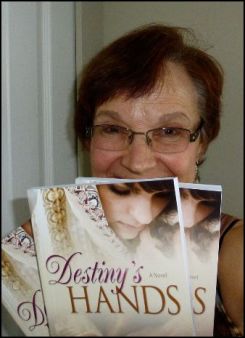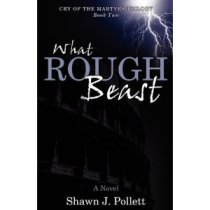 David Kitz is an award-winning Canadian author and Bible dramatist, currently celebrating the release of his newest book, The Soldier Who Killed a King (a true retelling of the Passion).
David Kitz is an award-winning Canadian author and Bible dramatist, currently celebrating the release of his newest book, The Soldier Who Killed a King (a true retelling of the Passion).
Janet: Welcome, David, and thanks for taking time to join us. First, I have to ask: what exactly is a Bible dramatist?
David: To put it simply, I act out or dramatize the Bible. For example I have memorized the Epistle of James and present the entire book in costume, often in place of the Sunday morning sermon. I do something similar with fourteen Psalms. In the case of the Psalms, I play the role of David.
Janet: That must have an incredible impact on your own spirit and on those who hear you. Does being able to immerse yourself in the Bible scenes enrich your ability to bring the stories to life?
David: Absolutely. Sometimes we can read the Bible in a detached sort of way, after all it was written in a different time and in a faraway place. But these were real people who lived and experienced these events. Putting yourself in their shoes brings the Bible to life in a whole new way.
Janet: Tell us a bit about The Soldier Who Killed a King.
David: This book was born out of a one-man drama called “The Centurion’s Report” that I have been performing for about twenty years now. After doing this four-act play for a few years I realized that this drama could form the basis for a novel.
Janet: Did connecting so deeply with the Roman soldier affect you personally?
David: Yes, it did. But even more significantly it affected my identification with the suffering of Jesus. It all happened in a rather mysterious or even mystical way. As my novel writing progressed, I eventually reached the point where I was describing the whipping Jesus endured from the Roman soldiers. At the same time I was diagnosed with a severe case of shin splints. My doctor said, “Things will get worse before they get better.” They did get worse—much worse. Over the next few weeks I wrote the chapters that detail the crucifixion. It was a descent into a personal place of extreme agony. The pain—my pain— kept getting worse until the point when Jesus died. But from that point on I started feeling better. In fact, I recovered rapidly. It seems I needed a taste of agony to make those chapters ring true.
Janet: Wow! God teaches in some unusual ways. What compelled you to write this story?
David: I believe that the suffering, death and resurrection of Jesus form the pivotal event in all of human history. As believers we need to experience the personally transformative power of those events. The book is intended to take you there—to immerse you in that life-changing experience.
Janet: Observing with the centurion does bring readers into the story. Any interesting research tidbits?
David: I found Herod Antipas to be a perfect foil for Jesus. In character and conduct he is the polar opposite of Jesus. He’s an ambitious schemer seeking to regain his kingdom.
Janet: It was interesting how you contrasted them in the book. I’m assuming Jesus is your favourite character. Who do you most relate to?
David: Actually, I most relate to the centurion, Marcus Longinus. Maybe it’s because I have played his part so often over the years. He is awestruck by Jesus miraculous power, but quite uncertain what to make of this messianic figure.
Janet: What other books have you written?
David: I’m a rather eclectic writer. My children’s book Little Froggy Explores the BIG World was also a Word Guild Award winner. I have written a devotional study on the psalms entitled Psalms Alive! My literary agent is currently seeking a publisher for my book on the life of James, the brother of Jesus.
Janet: Do you have any advice for beginning writers?
David: Don’t give up. This is a very tough business. Learn lots. Pray hard. Know your calling.
Janet: Is there a particular song or Scripture verse that’s made a big difference for you?
David: I have been crucified with Christ and I no longer live, but Christ lives in me. The life I now live in the body, I live by faith in the Son of God, who loved me and gave himself for me (Galatians 2:20).
Janet: From the serious to the trivial: Cake or Pie? And what’s your favourite season?
David: Pie by a country mile, and yes, I bake my own pies. Seasons? I like them all. Probably my favourite is a warm sunny day in fall with autumn colours ablaze.
Janet: What do you like to do to recharge?
David: Gardening.
Janet: Tell us something you appreciate about where you live.
David: Access to beautiful cycling trails.
Janet: Congratulations again on your new release, and I pray it impacts many people. Readers who want more can see my review of The Soldier Who Killed a King.
===
A stunning story of Holy Week through the eyes of a Roman centurion
 Watch the triumphal entry of the donkey-riding king through the eyes of Marcus Longinus, the centurion charged with keeping the streets from erupting into open rebellion.
Watch the triumphal entry of the donkey-riding king through the eyes of Marcus Longinus, the centurion charged with keeping the streets from erupting into open rebellion.
Look behind the scenes at the political plotting of King Herod, known as the scheming Fox for his ruthless shrewdness.
Get a front-row seat to the confrontation between the Jewish high priest Caiaphas and the Roman governor Pontius Pilate.
Understand as never before the horror of the decision to save a brutal terrorist in order to condemn the peaceful Jew to death.
If you’ve heard the story of Passion Week so often it’s become stale, now is the time to rediscover the terrible events leading from Jesus’s humble ride into the city to his crucifixion. The Soldier Who Killed a King will stun you afresh with how completely Christ’s resurrection changed history, one life at a time.
Read an excerpt: kregel.com/fiction/the-soldier-who-killed-a-king/
Find more about the author: davidkitz.ca
Like this:
Like Loading...













